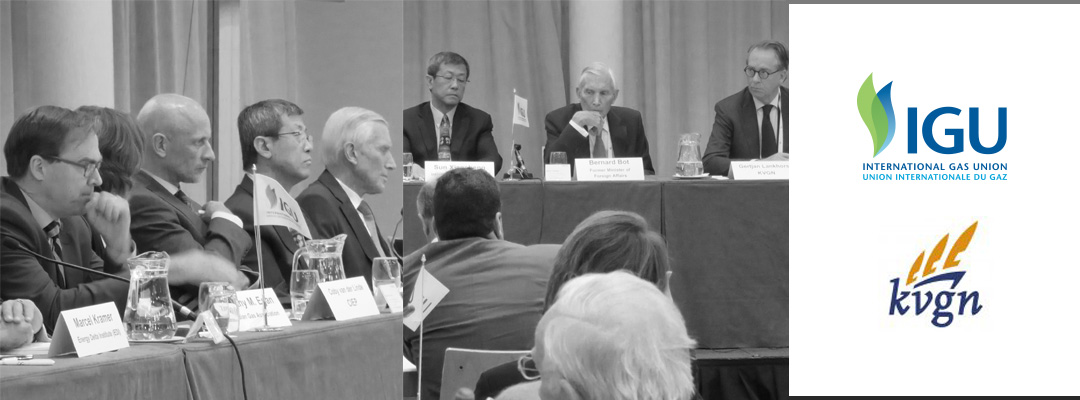IGU-KVGN Diplomatic Gas Forum - Energy Transition in the EU: The Role of Natural Gas in The Energy Future
Amsterdam, The Netherlands
The IEF Secretary General, Dr Sun Xiansheng delivered an opening presentation at the IGU-KVGN Diplomatic Gas Forum on "Energy Transition: The role of natural gas in the energy future", alongside key officials from the Dutch energy scene, international gas industry and the IEA. The IGU-KVGN Diplomatic Gas Forum took place on 20 October 2016 in Amsterdam. Next to IGU-KVGN members, the meeting also included ambassadors, and other high-level representatives from diplomatic missions in The Hague. The IEF also took part in workshops on the "Dutch Natural Gas Industry", and on the "Gas Industry’s Commitment to Managing the Methane Challenge" that were held prior to the Forum.
Dr Sun Xiansheng provided an overview of global energy market trends, and debriefed participants on the outcomes of the 15th International Energy Ministerial Forum held on 26-28 September in Algiers, Algeria. In respect of natural gas market trends, Dr Sun noted that producers and consumers have different views on the role of natural gas in future energy matrices. Producers, on one hand, see gas demand grow by 2.4% yearly, taking a share of 28% of global energy demand by 2040, larger than all other energies. Consumers, on the other hand, see gas demand grow slower reaching 24%-23% of global energy demand, depending on scenarios, notwithstanding the historic opportunities for natural gas to deliver on globally agreed transition goals. New and more diverse resources are coming on stream, including through a wider deployment of unconventional drilling, and LNG technologies. In combination with a slow-down in economic growth, this has led to a significant fall in natural gas prices and a reduction in investment that may erode gas market security over the longer term.
Dr Sun highlighted the importance of the collaborative work on gas market transparency in the Joint Organisations Data Initiative (JODI) that IEF coordinates together with JODI-Partner Organisations (APEC, Eurostat, GECF, IEA, OLADE, OPEC, and UNSD), and the need for enhanced dialogue between government and industry stakeholders to ensure that natural gas lives up to its potential to improve energy market security, and helps to fulfil an orderly energy transition that enables more sustainable economic growth. New visions on a healthy energy future focus on energy efficiency and clean fossil fuel, as well as renewable energy technologies that may lead to a significant increase in gas demand in growth economies over the next decades. Dr Sun highlighted that the 5th IEF-IGU Ministerial Gas Forum will be hosted by the Minister of Petroleum and Natural Gas of India, H.E. D Dharmendra Pradhan on 6 December 2016 in New Delhi, India, under the theme "Gas for Growth: Improving Economic Prosperity and Living Standards" to foster further dialogue on the opportunities and risk in future gas market development.
Mr Gertjan Lankhorst, CEO of the Dutch natural gas wholesaler GasTerra, noted that natural gas is viewed differently in Europe than in other regions that look at it more positively. A new narrative on the role of gas headlined by "Gas by Design" may help to enhance public acceptance of natural gas and allow for system integration among varied energies at a decentralised level. He expressed the preference that the EU works towards a single target expressed in a meaningful CO2 price, rather than energy efficiency, renewable or other goals. This to ensure natural gas plays its role where more sustainable sources are not yet available, and delivers the largest contribution to society.
Dr Bernard Bot, Meines Holla & Partners and Former Minister of Foreign Affairs of the Netherlands, looked back to the future observing that in respect of transition in general, little of what was predicted has materialised in practice, while many modern day marvels we live with today were not foreseen in the past. Focusing on energy transition, Dr Bot pointed at the need for a better assessment of the economic rationale of new approaches and technologies, such as the import of biomass from across the world, against others that are pursued less vigorously, such as Carbon Capture Use and Storage. Dr Bot believed that, for instance, CO2 can play a bigger role in the fertiliser industry. He also cautioned that while a low carbon energy future is a beautiful vista that we should strive towards, we should remain realistic and keep all options open.
Mr Tim Gould, Head of Division, World Energy Outlook at the IEA, noted that new LNG projects mainly from the United States and Australia are set to soon be delivered into an already well supplied market. While Mr Gould noted that the EU gas market outlook implied less and more sporadic use, more globally integrated markets are set to deliver long-term gains by providing a broader platform for gas security in Europe. However, as the system evolves over time certain securities such as for instance those provided by fuel switching capacity, and national supply resilience are likely to fall away.
Professor Dr Coby van der Linde, Director of the Clingendael International Energy Programme remarked that policymakers and the wider public may well perceive advocacy for natural gas as the cleanest of the fossil fuels as a negative message. She recommended that new more positive approaches should be found for natural gas to remain part of the energy future. This could be achieved through sharpening focus on the role of electrons rather than molecules, and government support for efforts to present natural gas in a more positive light. Dialogue on energy transition and the entry of new energy sources, should go hand in hand with an assessment on the exit of existing energy technologies as well.






